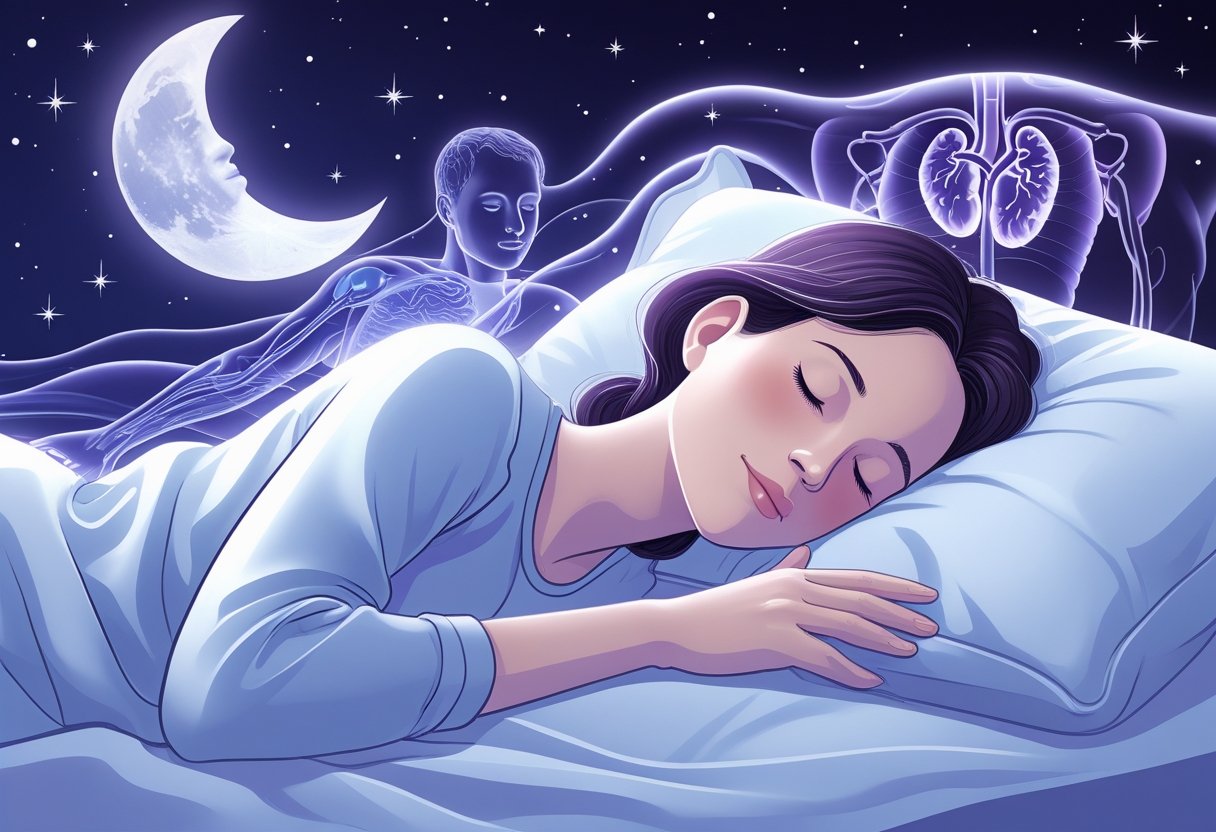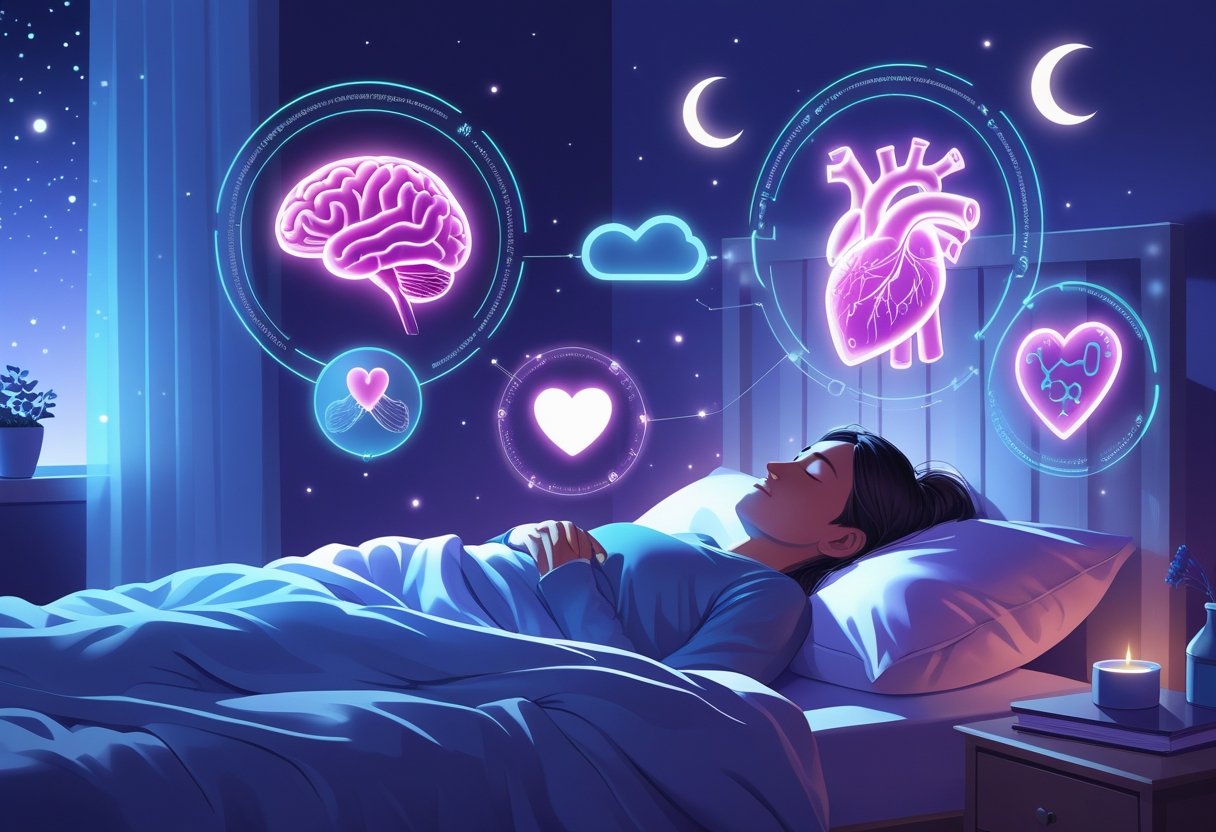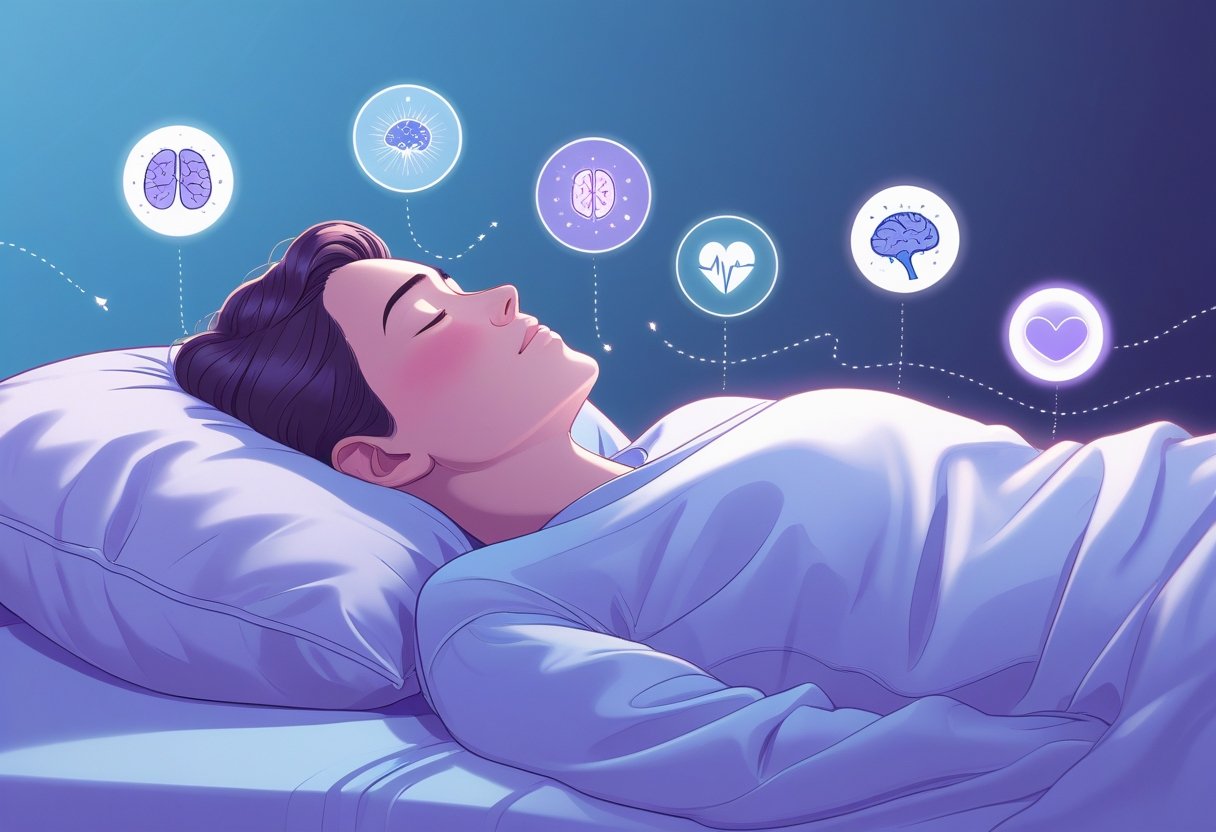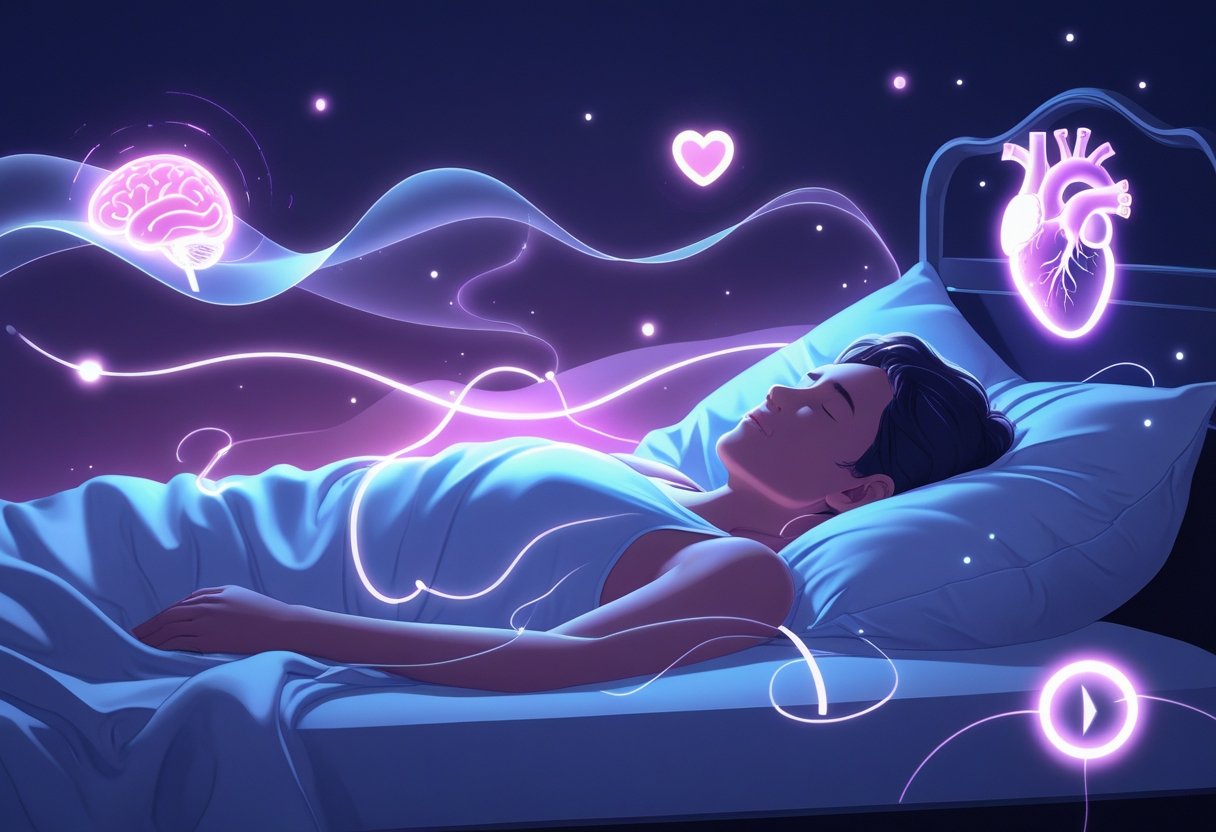Getting enough rest is important in the body by allowing repair and restoration to occur. During this time, the body supports healthy brain function and maintains physical health. It strengthens the immune system, reduces inflammation, and lowers the risk of many chronic diseases.
Beyond physical recovery, rest boosts mood and energy by renewing the brain and body. Without enough rest, the chances of developing high blood pressure, depression, and poor concentration rise. Knowing what happens during rest helps people understand why it remains essential for overall well-being.
Key Takeaways
- Rest supports the body’s repair and immune system.
- It improves mood, energy, and brain function.
- Lack of rest raises health risks and impairs daily performance.
- Proper mattress support promotes deeper and uninterrupted sleep cycles that are essential for muscle recovery, mental clarity, and emotional balance.

How Sleep Works

Sleep involves a series of complex processes that help the body and brain rest and heal. Internal systems regulate when to sleep and how deeply to rest. During sleep, the body moves through different phases, each marked by distinct activities.
Sleep Cycles
Sleep breaks down into cycles lasting about 90 minutes each. These cycles repeat several times throughout the night. Each cycle consists of two main parts: non-rapid eye movement (NREM) and rapid eye movement (REM) sleep.
- NREM sleep includes stages 1 through 3, during which the body moves progressively into deeper sleep.
- REM sleep usually occurs at the end of the cycle and is when dreaming takes place.
These cycles enable the body to repair tissues, strengthen immune function, and replenish energy.
Stages of Sleep
Sleep unfolds through stages that each serve specific roles.
- Stage 1: This stage marks the shift from wakefulness to sleep. Muscle activity slows down, and brief muscle jerks may occur.
- Stage 2: Body temperature drops, heart rate slows, and brain waves slow with occasional bursts of rapid activity called sleep spindles.
- Stage 3: The deepest sleep stage, where the body carries out most of its repair work such as muscle growth and tissue healing. Breathing and heart rate reach their slowest rates.
Each stage supports physical health and prepares the brain for REM sleep.
Brain Activity During Sleep
The brain stays active throughout sleep, switching between different patterns depending on the stage.
In stages 1 and 2, brain waves slow down yet remain responsive to the environment. This lighter sleep prepares the brain for deeper rest. During stage 3, brain waves slow further, marking the most restorative phase. This stage supports memory consolidation and body repair.
REM sleep features brain waves similar to wakefulness, during which the brain processes emotions and memories. This phase aids learning and mental well-being. Across all stages, the brain clears waste and balances chemicals that influence mood and alertness to help the body stay ready for waking hours.
Physical Benefits of Sleep
Sleep is a key factor in maintaining a healthy body that involves supporting essential processes that repair damage and strengthen defenses against illness. These functions explain why rest is refreshing and necessary.
Cellular Repair and Growth
When you sleep, your body gets to work fixing itself. It repairs cells that get worn out during the day. It also cleans up waste your cells make while you’re awake. This cleanup helps protect your organs and keeps things running smoothly. Most of your growth hormones get released during deep sleep. These hormones help your muscles recover, your bones grow, and your body heal after injuries. That’s why getting enough rest is important, especially after working out or being sick.
But if you don’t sleep enough, these repairs slow down. Your body heals slower, and your cells take more damage. Over time, that can hurt your health and make you age faster.
Immune System Support
Your body gets stronger when you sleep. That’s when it makes cytokines—proteins that help fight off colds, the flu, and other stuff that makes you sick. If you don’t get enough rest, your body doesn’t make enough of these proteins. It also makes fewer white blood cells. That means it’s harder to fight off viruses or bounce back from being sick.
Getting enough sleep every night gives your immune system a better shot at doing its job. It helps you recover faster and keeps inflammation under control. Long-term inflammation is tied to a lot of serious health problems, so rest really matters.
Sleep isn’t a magic cure, but it’s one of the best tools your body has to stay strong.

Mental and Emotional Effects of Sleep
Sleep is crucial in maintaining mental and emotional balance. It allows the brain to process information, manage feelings, and keep thoughts sharp. When rest falls short, these essential functions weaken, which leads to challenges in daily life.
Memory Consolidation
When you sleep, your brain gets to work. It sorts through everything you learned that day and decides what to keep. This happens during deep sleep. It moves stuff from short-term memory to long-term storage. If you don’t get enough sleep, your brain has a harder time saving new memories or pulling up old ones. That’s why it’s tough to learn something new or remember things when you’re tired.
Basically, sleep gives your brain a reset. After a good night’s rest, it works better. Simple as that.
Mood Regulation
Rest directly influences mood and emotional well-being. People who sleep well tend to feel calmer and more balanced. Conversely, poor sleep increases irritability, stress levels, and the risk of anxiety or depression.
This effect arises because sleep impacts brain regions that regulate emotions. Insufficient rest makes coping with stress more difficult and heightens feelings of overwhelm. Obtaining enough quality sleep supports emotional stability and makes it easier to face daily challenges with steadiness.
Cognitive Function
Cognitive function includes attention, problem-solving, and decision-making. When you’re well-rested, your mind works better. You can stay sharp, react faster, and avoid small mistakes.
But when you don’t sleep enough, it gets harder to concentrate. You take longer to figure things out. You might even forget simple stuff or mess up tasks you usually do fine. Sleep gives your brain a break so it can reset and get back to full strength.
Scientists say one reason sleep feels so good is because it brings balance back to your brain. That balance isn’t just good for focus, it helps your mood too. So sleep isn’t just about rest. It’s key for thinking straight and feeling okay.

Sensations and Perceptions During Sleep

Sleep involves changes in how the mind senses and experiences the world. People usually wonder why sleep feels good and what happens to their awareness during this time.
Why Rest Feels Pleasurable
Deep rest feels satisfying since the body moves through stages that allow physical restoration while the brain sorts emotions and memories. In non-REM stages, breathing slows, heart rate drops, and muscles loosen, which eases stress and brings a peaceful and comforting sensation.
Certain brain chemicals, such as dopamine and serotonin, release to create feelings of comfort and pleasure. The brain’s focus shifts to functions that promote healing and balance, which helps explain why rest feels so rejuvenating and why many wake up with a clearer mind.
Consciousness and Dreaming
Most people think we’re completely out when we sleep. But that’s not how it works. Our brains don’t shut off. They just shift between levels of awareness. When we hit REM sleep, the brain lights up almost like we’re awake. That’s when the wild dreams happen—the ones with colors, sounds, and strong feelings. It can feel like your mind is off in another world.
In other sleep stages, our awareness fades more. But the brain still keeps working quietly in the background. That’s why we might hear a sudden noise and wake up, or remember a dream later, even though we seemed fully asleep.
Common Myths and Misconceptions About Sleep
Sleep is vital for the brain and body, yet many false ideas about it leave people confused. Knowing the facts allows us to see how sleep supports health and what it truly does.
Are You Dead When You Sleep?
Some believe sleep resembles death because the body looks still and unresponsive, but this is false. While you sleep, the body remains very much alive and active inside. The brain keeps controlling breathing, heartbeat, and body temperature. Although muscles rest, essential processes such as blood circulation and hormone release still occur.
Sleep is a natural and reversible state that lets the body rest and repair, completely different from death, which halts these vital systems. Failing to understand this difference can create needless fear about sleep.

How Your Mattress Supports Sleep’s Benefits for the Body
Quality sleep depends on the support your bed provides. By keeping the spine, neck, and joints properly aligned, it reduces the chance of waking up with aches or tension. The right mattress eases pressure points by distributing body weight evenly, which prevents discomfort in areas like the hips and shoulders, so muscles fully relax.
A medium-firm mattress is great since it balances softness with support. Some mattresses, like SweetNight Prime Memory Foam Mattress, provide dual-sided firmness to let you customize comfort for better rest.
Strong support during sleep helps the body repair itself because it aids muscle recovery through the release of growth hormones needed for healing and growth. Comfort also affects how deeply you sleep, as a comfortable mattress encourages uninterrupted sleep cycles, which are essential for mental clarity and emotional balance.
Here’s a quick look at key mattress features that support the body during sleep:
- Proper spinal support – Prevents pain and stiffness
- Pressure relief – Reduces muscle tension
- Firmness adjustability – Personalizes comfort
- Even weight distribution – Enhances muscle recovery
Choosing the right mattress matters for preserving sleep quality and maximizing the body’s natural restoration processes.
The SweetNight Prime Memory Foam Mattress stands out with its unique design that includes multiple layers of premium foam, which adapt to your body’s shape and reduce motion transfer. This feature can be especially helpful if you share your bed with a partner and want undisturbed rest through the night.
Another advantage of the SweetNight Prime Memory Foam Mattress is its cooling properties, which regulate temperature so you stay comfortable even on warmer nights. By combining support, pressure relief, and temperature balance, it’s an excellent option for anyone seeking better sleep quality.

Frequently Asked Questions
Sleep is important across many areas of health. It allows the body to heal, sharpens the mind, regulates emotions, and helps maintain strong long-term health.







